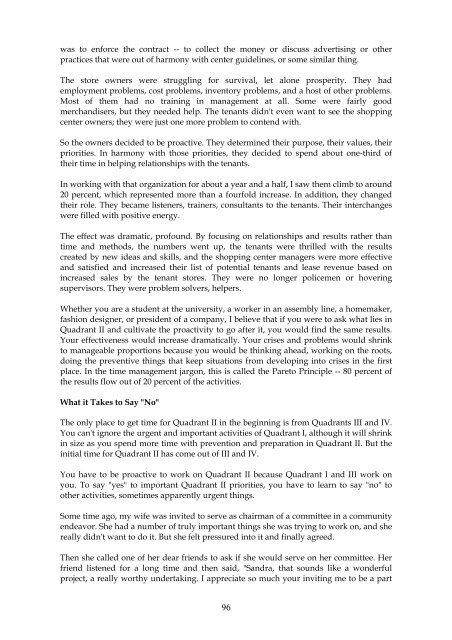Covey - The 7 habits of highly effective people
Create successful ePaper yourself
Turn your PDF publications into a flip-book with our unique Google optimized e-Paper software.
was to enforce the contract -- to collect the money or discuss advertising or other<br />
practices that were out <strong>of</strong> harmony with center guidelines, or some similar thing.<br />
<strong>The</strong> store owners were struggling for survival, let alone prosperity. <strong>The</strong>y had<br />
employment problems, cost problems, inventory problems, and a host <strong>of</strong> other problems.<br />
Most <strong>of</strong> them had no training in management at all. Some were fairly good<br />
merchandisers, but they needed help. <strong>The</strong> tenants didn't even want to see the shopping<br />
center owners; they were just one more problem to contend with.<br />
So the owners decided to be proactive. <strong>The</strong>y determined their purpose, their values, their<br />
priorities. In harmony with those priorities, they decided to spend about one-third <strong>of</strong><br />
their time in helping relationships with the tenants.<br />
In working with that organization for about a year and a half, I saw them climb to around<br />
20 percent, which represented more than a fourfold increase. In addition, they changed<br />
their role. <strong>The</strong>y became listeners, trainers, consultants to the tenants. <strong>The</strong>ir interchanges<br />
were filled with positive energy.<br />
<strong>The</strong> effect was dramatic, pr<strong>of</strong>ound. By focusing on relationships and results rather than<br />
time and methods, the numbers went up, the tenants were thrilled with the results<br />
created by new ideas and skills, and the shopping center managers were more <strong>effective</strong><br />
and satisfied and increased their list <strong>of</strong> potential tenants and lease revenue based on<br />
increased sales by the tenant stores. <strong>The</strong>y were no longer policemen or hovering<br />
supervisors. <strong>The</strong>y were problem solvers, helpers.<br />
Whether you are a student at the university, a worker in an assembly line, a homemaker,<br />
fashion designer, or president <strong>of</strong> a company, I believe that if you were to ask what lies in<br />
Quadrant II and cultivate the proactivity to go after it, you would find the same results.<br />
Your <strong>effective</strong>ness would increase dramatically. Your crises and problems would shrink<br />
to manageable proportions because you would be thinking ahead, working on the roots,<br />
doing the preventive things that keep situations from developing into crises in the first<br />
place. In the time management jargon, this is called the Pareto Principle -- 80 percent <strong>of</strong><br />
the results flow out <strong>of</strong> 20 percent <strong>of</strong> the activities.<br />
What it Takes to Say "No"<br />
<strong>The</strong> only place to get time for Quadrant II in the beginning is from Quadrants III and IV.<br />
You can't ignore the urgent and important activities <strong>of</strong> Quadrant I, although it will shrink<br />
in size as you spend more time with prevention and preparation in Quadrant II. But the<br />
initial time for Quadrant II has come out <strong>of</strong> III and IV.<br />
You have to be proactive to work on Quadrant II because Quadrant I and III work on<br />
you. To say "yes" to important Quadrant II priorities, you have to learn to say "no" to<br />
other activities, sometimes apparently urgent things.<br />
Some time ago, my wife was invited to serve as chairman <strong>of</strong> a committee in a community<br />
endeavor. She had a number <strong>of</strong> truly important things she was trying to work on, and she<br />
really didn't want to do it. But she felt pressured into it and finally agreed.<br />
<strong>The</strong>n she called one <strong>of</strong> her dear friends to ask if she would serve on her committee. Her<br />
friend listened for a long time and then said, "Sandra, that sounds like a wonderful<br />
project, a really worthy undertaking. I appreciate so much your inviting me to be a part<br />
96


